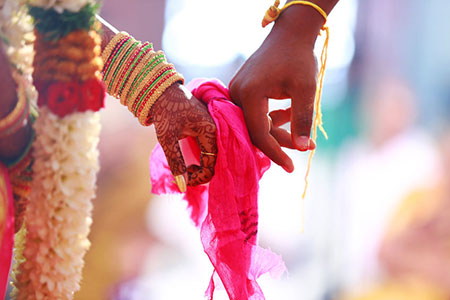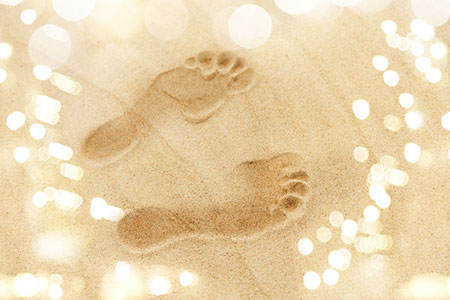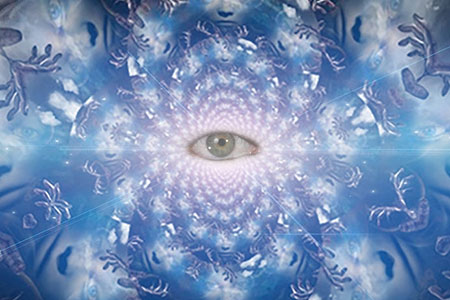religion
The Symbolism Of Wedding Ribbons And Cords
 In a recent reading, I had visions of a wedding and a shotgun! I did my best to diplomatically convey what I was seeing to the client. I also mentioned how I saw lots of colored ribbons, and a rather large gathering of people of all ages and cultures.
In a recent reading, I had visions of a wedding and a shotgun! I did my best to diplomatically convey what I was seeing to the client. I also mentioned how I saw lots of colored ribbons, and a rather large gathering of people of all ages and cultures.
He laughed, and said that two years ago, he felt a strong urge for himself and his partner to get married. They both came from large families and wanted to make sure that certain ailing, elderly members would still be able to attend and join in the celebration.
He also said he was so glad spirit prompted them to marry sooner than later, because the pandemic would have prevented not just the large gathering of guests from attending, but also many from traveling from various corners of the world as they had done. Apparently, the ribbons I saw related to the traditional pagan handfasting they had chosen as the ceremony for their special event.
The handfasting ritual had always fascinated him, because of his own Celtic origins and he explained how both his and his partner’s hands were bound together with a ribbon during the vows and exchanging of rings. I later learned from a Pagan friend that cord is sometimes also used for this purpose in such a ceremony.
In many traditions the use of colored ribbons and cords is of spiritual significance at certain ceremonies, especially weddings. They are typically used to physically connect the couple, or they are placed in or around an altar. The cord is a symbol of the lifetime bond the couple is entering into.
For example, a wedding cord, also known as the ‘wedding lasso,’ is used in some Catholic wedding ceremonies. It typically consists of a loop of rosary beads made out of white satin or silk, and formed into a figure eight shape, and placed around the bride and the groom after they have made their vows.
The Old Man And The Christmas Bells
 With Christmas upon us I have been hearing church bells every Sunday in recent weeks, just like in my younger years. Going back to those years in my mind, I can remember being very young when my mother was stopped by a man who told her he was the new pastor at this church far from our house. He looked younger than my parents and he asked my mother if we had a church that we go to. She told him we did not and the man gave us an invitation to attend his church.
With Christmas upon us I have been hearing church bells every Sunday in recent weeks, just like in my younger years. Going back to those years in my mind, I can remember being very young when my mother was stopped by a man who told her he was the new pastor at this church far from our house. He looked younger than my parents and he asked my mother if we had a church that we go to. She told him we did not and the man gave us an invitation to attend his church.
Since this church was reasonably close to where I grew up, it was fun to walk there at first, but after a while it seemed like forever. But my mother made a promise to us kids that after church we could get a soda pop or an ice cream cone if we were good. Mom knew how to persuade us kids to go to church without a fuss.
When I first looked at the church is seemed big, but it looked very different from the Catholic church across the street. We opened the doors and were greeted by two old ladies who handed out the programs for the service. They also told me that I would meet my mother down here in the same place after Sunday school.
Next I met my Sunday school teacher. His name was Rusty and since I was the ‘new kid on the block’, he introduced me to all the other children. Since I didn’t know any of them, I didn’t know what to think. Then Rusty started with the lesson and once again it seemed like forever for Sunday school to be over.
Later, I met mom downstairs and as I was walking down the hall a older man greeted me. I greeted him in return, not thinking much of it. After we had been seated and the pastor opened with prayer, I remember looking around and noticing that the old man was not sitting in the same pews anymore. He seemed to have left.
To Live Gratitude Is To Touch Heaven
 One aspect of spiritual living too seldom addressed is our lack of true appreciation and gratitude for all the blessings in our lives, regardless of our circumstances.
One aspect of spiritual living too seldom addressed is our lack of true appreciation and gratitude for all the blessings in our lives, regardless of our circumstances.
Some spiritual seekers tend to be very keen on beating the drum of prosperity, and becoming fixated on the Law of Attraction and manifesting abundance, which is too often merely a thinly disguised obsession with material wealth and earthly comforts.
Most of us simply take too much for granted every day. We experience so many blessings of joy, beauty, forgiveness, protection and Divine grace, which we seldom acknowledge in our lives. We always have something to be grateful, or thankful for, no matter how difficult times may be. As a species we are very good at complaining about what we don’t have, but we seem to find it difficult to give thanks for what we do have.
We seldom express our gratitude and appreciation towards those we love and cherish, and we hardly ever remember to share what we have with those who have less – not because we feel obligated, but because we feel so much appreciation that we simply want to share our abundant blessings with others. Charity is not about lending a helping hand; it is about celebrating all that we have, and to share our joy and appreciation.
Research has demonstrated an indisputable connection between gratitude and spirituality. It is no coincidence that gratitude is regarded as a much cherished and valued quality by most world religions, including the Buddhist, Muslim, Hindu Jewish, and Christian traditions. When reviewing the large body of research done on the subject, gratitude seems to play a much more noteworthy role in our happiness and well-being than most other emotions and personality traits.
Several research studies in recent years have shown that people who have a tendency towards higher levels of gratitude also tend to report higher levels of psychological, emotional and physical well-being. People who are grateful have been shown to be happier, more optimistic and more content with their lives. They also appear to have lower levels of stress and depression, and they are more satisfied with their relationships and social interaction with others.
The Resilient Spirit Knows No Bounds
 Our world has lately been feeling like a carnival ride gone awry. Despite all the madness, one thing bears remembering: the innate resilience of our spirit.
Our world has lately been feeling like a carnival ride gone awry. Despite all the madness, one thing bears remembering: the innate resilience of our spirit.
We are still here, and we are still standing. And we are willing, able, and capable to forge ahead. For many the move forward will be in a completely different direction than before, while for some the path has merely been adjusted to better suit us.
To be resilient is to be able to withstand or recover quickly from difficult conditions. Resilience is the ability to bounce back into shape, after being bent, stretched or compressed. This is the essence of what our spirit is designed to do.
Our spirit or soul is the eternal part of us that connects us to the Divine, Source, God, the Universe. It is the Spirit we call upon to show us the way, carry us through, or facilitate the manifesting our dreams, goals and aspirations. It is that unbreakable, unshakeable part of us that fuels us to continue to move forward regardless of circumstance.
Spirit is also the place where our hearts and minds find peace, love, compassion and understanding. Every time our spirit is stretched beyond normal bounds, and we bounce back, we are even stronger, more confident, more loving, and more certain of ourselves.
Through surviving much adversity, we also come to understand that because of this resilience, what we are made of is not meant to be broken. If anything this resilience allows to stretch even further, reach even higher, and accomplish even more.
Leaving Your Spiritual Footprint
 A footprint is an impression left behind by a human foot or shoe on the ground or some other surface. If you have ever been at the beach, you have probably noticed that this is the one place where a footprint is so easily and readily left behind. It I also not too difficult to determine if the impression was left by a an adult, or a small child. But have you gone any further than merely noticing those footprints? Have you ever wondered where does the person live who left that footprint? What is their education and career? What is their current relationship status? What is the life and legacy embedded in each of those imprints?
A footprint is an impression left behind by a human foot or shoe on the ground or some other surface. If you have ever been at the beach, you have probably noticed that this is the one place where a footprint is so easily and readily left behind. It I also not too difficult to determine if the impression was left by a an adult, or a small child. But have you gone any further than merely noticing those footprints? Have you ever wondered where does the person live who left that footprint? What is their education and career? What is their current relationship status? What is the life and legacy embedded in each of those imprints?
Human souls also leave behind their ‘metaphysical footprint’ by fulfilling their spiritual calling and soul purpose in their lifetime. The more exceptional or extraordinary ones are written about in our history books. They are great teachers, prophets and spiritual leaders that have left a discernible legacy behind when they departed from this world. When any person takes on a cause, with sometimes the most forceful opposition, to create an new and improved world for the common good, it is always an indicator that a spiritual footprint is being made.
Saint Teresa of Calcutta, simply known as Mother Theresa, for example, is certainly a spiritual icon that has left a well-established footprint of compassion, kindness and charity that continues to be recognized all over the world. We do not expect her to have been a perfect person, but the sincerity and love that she professed for some of the most spurned and downtrodden cannot be denied by anyone. It is to me abundantly clear that she indeed left a footprint of love, compassion and acceptance which equates at the end of the day to her being totally connected to and aligned with spirit.
The Spiritual Cleansing Of Negative Energies
 Negative energies and dark entities are sometimes misunderstood and misused concepts in spirituality. The term ‘negative energy’ is typically thought of as an ‘evil force’ that is intending harm to you, or something sinister that lies hidden in your home. But this is often not the case. I have a somewhat different view of this.
Negative energies and dark entities are sometimes misunderstood and misused concepts in spirituality. The term ‘negative energy’ is typically thought of as an ‘evil force’ that is intending harm to you, or something sinister that lies hidden in your home. But this is often not the case. I have a somewhat different view of this.
I believe much of the modern day fear and superstition around ‘dark entities’ may be due to the misunderstanding of old texts scribed in a style that may be too cryptic for today’s language and worldview. There are many instances in both Christian and Buddhist religious literature, for example, in which ‘demons’ are mentioned, but in my opinion they are referring to these phenomena in a poetic manner, as a metaphor.
One clear example of this is the so-called ‘Noonday Demon,’ or ‘Midday Devil’ found in Psalm 90:6 of the Hebrew Bible. It is a demonic figure believed to be active around noon every day to make people restless, distracted and excitable, causing its victims to neglect their work or duties. Well, we all know that sluggish feeling we tend to get after a lunch hour. The digestive process takes quite a bit of our energy, and spikes in our insulin levels, as well as neurotransmitters like serotonin and melatonin, doesn´t help to keep our focus on a specific task.
The solution proposed in traditional texts for this ‘demonic activity’ does not, however, involve exorcisms with Holy Water or other radical metaphysical interventions. Instead what is recommend is mere tenacity and patience. It is evidently more of a normal, physical challenge that one has to overcome, instead of it being a ‘psychic attack by the devil.’
